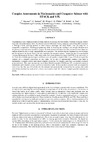Identificador persistente para citar o vincular este elemento:
https://accedacris.ulpgc.es/handle/10553/52713
| Título: | Complex Assessments in Mathematics and Computer Science with STACK and VPL | Autores/as: | Kutzner, T. Steinert, C. Weigert, M. Wälder, O. Robel, K. Yan, A. |
Clasificación UNESCO: | 58 Pedagogía 530602 Innovación tecnológica |
Palabras clave: | LMS assessment Automatic formative assessment Education Mathematics Computer science |
Fecha de publicación: | 2018 | Conferencia: | V Jornadas Iberoamericanas de Innovación Educativa en el Ámbito de las TIC y las TAC (InnoEducaTIC 2018) | Resumen: | Programming is not complicated and yet many students do not pass the first hurdles. Software is logical, follows clear rules and mathematical laws. Any healthy person with basic literacy, numeracy and writing skills can learn it. Writing a book, painting pictures or other creative challenges are much harder. And yet many fail at comparable competences. Teaching programming skills by listening and reading is not enough. Students need the process of trial and error in order to acquire the skills needed and should be able to learn by them. However, students should be able to work independently on a computer. The problem that the beginners are overwhelmed and the advanced are bored. This is the case especially in computer science. Despite the use of a comfortable Learning Management System (LMS), many tasks have been submitted to paper and PDF at our university so far. Since the available question-types could not cover all possible complex tasks, it was difficult to inspire the lecturers for a complete digitization of their tasks. To be able to automatically evaluate even tasks in mathematics, computer science and related scientific disciplines two modules have been successfully evaluated at our university. This paper presents the use of these Moodle modules STACK and VPL in selected courses in mathematics and computer science and how to randomize tasks. In these modules complex tasks are prepared in such a way that they are still solvable for the students and automatically evaluated by the system, thus could considerably facilitate the work of the lecturers and academic staff. On concrete examples possible solutions are shown. | URI: | https://accedacris.ulpgc.es/handle/10553/52713 | ISBN: | 978-84-09-02374-5 | Fuente: | V Jornadas Iberoamericanas de Innovación Educativa en el Ámbito de las TIC y las TAC, Las Palmas de Gran Canaria, 15 y 16 de noviembre de 2018, p. 375-381 |
| Colección: | Actas de congresos |
Visitas
164
actualizado el 19-may-2024
Descargas
143
actualizado el 19-may-2024
Google ScholarTM
Verifica
Altmetric
Comparte
Exporta metadatos
Los elementos en ULPGC accedaCRIS están protegidos por derechos de autor con todos los derechos reservados, a menos que se indique lo contrario.
